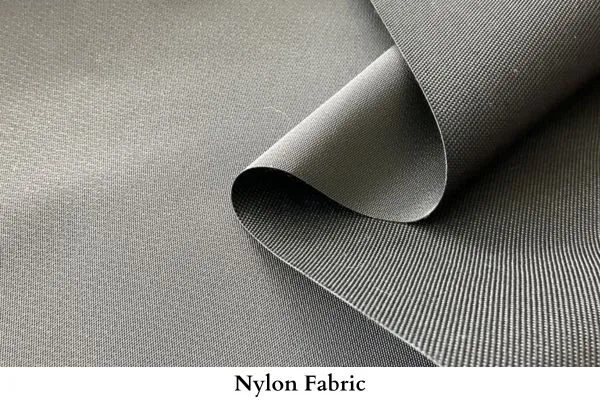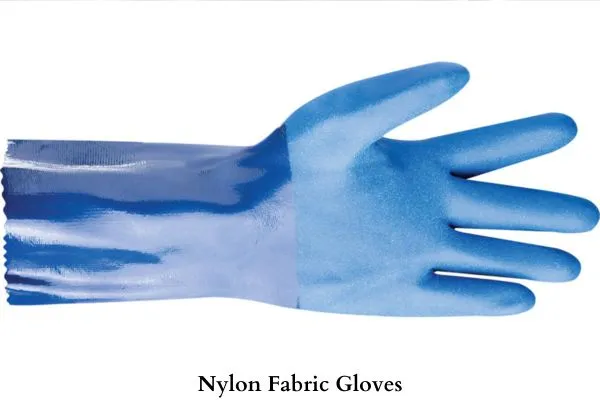Nylon is one of the most popular fabrics in the textile industry. Typically derived from petroleum, nylon describes a silk-like thermoplastic that can be melted and formed into strands, films, or other structures. Even this fabric is hardly seen to apply in clothing. however, it is vastly used to produce different textile products.

Nylon is completely synthetic, meaning they have no organic base, in contrast to other organic materials. This fabric comes with several advanced features, making it suitable for particular applications. In this article, I shall discuss different crucial properties of nylon fabric in detail.
Properties of Nylon Fabric
Nylon comes with several features such as high durability, excellent flexibility, lightweight, and so on. Let’s explore some of the important properties of Nylon fabric in detail.
| Property | Description |
|---|---|
| Chemical Composition | Polyamide, derived from petroleum or other monomers. |
| Tensile Strength | High tensile strength; excellent durability and resistance to wear and tear. |
| Elasticity | Good elasticity; recovers its original shape after stretching. |
| Abrasion Resistance | Highly resistant to abrasion and surface damage. |
| Moisture Absorption | Absorbs moisture (4-4.5%) but dries quickly. |
| Thermal Resistance | Melting point around 250°C; can deform under heat. |
| Chemical Resistance | Resistant to many oils, greases, and chemicals, but sensitive to acids. |
| Lightweight | Lightweight compared to many other synthetic materials. |
| Dyeability | Can be easily dyed to produce vibrant colors. |
| UV Resistance | Moderate; may degrade under prolonged UV exposure without UV stabilizers. |
| Electrical Properties | Acts as an insulator; non-conductive. |
| Biodegradability | Non-biodegradable; takes decades to decompose. |
| Recyclability | Fully recyclable; often repurposed into fibers or engineering plastics. |
Table of Contents
Highly Durable
One of the standout features of nylon is that it is a highly durable fabric that comes with high tensile strength. Strong and long-lasting, this material can tolerate years of use without losing the ultimate quality. Its synthetic nature contributes to its robustness. As it is a highly durable fabric, it is suitable and perfect for those projects that need a material that can last longer.
Nylon is Lustrous
Lustrous is another key feature of Nylon and this fabric has a sheen because it is glossy. Depending on the intended usage, the nylon fabric might be extremely glossy, semi-lustrous, or drab. Its frequent use as a cloth can be attributed to this.
Excellent Flexibility
In addition to durability, nylon also has excellent flexibility. The natural elasticity of this material makes it a highly flexible fabric. Flexibility is such a feature that allows it to bend without losing the original or basic shape as well as strength. Nylon is also beneficial for things that need excellent flexibility because of its capacity to take on any shape.

Lighter Weight Fabric
Another standout feature of nylon is that it is a lightweight fabric. Compared to other synthetic fabrics, nylon is relatively less in weight. Clothing or textile items made of this fabric are also less bulky compared to those manufactured of other synthetic fabrics.

Resistance to Heat and Chemical
The ingredients of nylon are oxygen, water, and coal. Hexamethylene diamine and adipic acid (diacid) are the two compounds that are created when these components mix with a polymer. These compounds are all made up of six molecules of carbon. Nylon is resistant to most chemicals because of its strong bonds. Moreover, nylon is sometimes referred to as a thermoplastic as it can high temperatures.

Does Not Absorb Water
Compared to cotton as well as wool fabric, nylon is far less absorbent. This fabric absorbs less water as well as sometimes it does not absorb water. A nylon’s electrical resistance is one of the qualities that will alter when it absorbs water. Because nylon fiber is hydrophobic and does not absorb moisture, it is the perfect material for situations where moisture resistance is required.

Nylon is Resilient
Despite its tiny strands, nylon is robust and resilient enough to endure years of use. Its synthetic nature contributes to its resilience. Nylon is helpful for things that need to be flexible since it can mold almost any shape. The inherent elasticity of nylon accounts for its flexibility.
Dries Quickly
Last but not least, nylon fabric also dries quickly. This fabric is relatively easy to wash and it is also safe to put into the washing machine to get the job done more easily and effortlessly. After washing, you can put this fabric under direct sunlight and it will take less time to dry thoroughly.
Wrap Up
Hope you have enjoyed reading this article and have got a clear idea about the properties of nylon fabric. However, one thing mentioned is that the properties that I have mentioned above can vary slightly based on the types of nylon fabric. Ultimately, it is a particular type of fabric that is widely used to manufacture different textile products.
